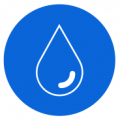Low water losses in Ostrava region are at the level of developed European countries
 Water
Water
The Ostrava Water and Sewerage Company (OVAK) in cooperation with the City of Ostrava invest hundreds of millions of Czech crowns each year in water supply infrastructure restoration, development and repairs. Thanks to investments made and modern technologies applied, they have managed to keep water losses in the water supply system at a very low level in the long term. In 2017, the water loss in a pipeline system more than 1,500 km long was only 2.2 million cubic metres of water, which is only 12.4% of the total water volume supplied to consumers. The water loss in 2017 is the lowest in the history of the OVAK in terms of volume.
In 1996, the loss in Ostrava reached the huge amount of 16 million cubic metres of drinking water, which corresponded to a water loss level of 36%. For illustration, this is roughly a one-year volume of water supplied in Ostrava in 2017.
“Thanks to well-targeted investments in water supply infrastructure restoration and repairs, the OVAK have successfully managed to keep water loss below 2.5 million cubic metres since 2014. This, converted to the total volume of drinking water supplied, ranks us among the advanced European countries,” stated Ing. Vojtěch Janoušek, the General Manager of the OVAK.
This is also the merit of cooperation with the SUEZ corporation, the majority owner of the waterworks, enabling implementation of modern technologies in Ostrava which have been proven in western Europe. This mainly concerns the water supply system monitoring using the SCADA application as a part of the modern control centre and the continuously developing project of remote water meter reading. The system works on the principle of reading data from transmitters installed on water meters which is sent to receivers using a digital coded signal. The receivers transmit the data to data storage products using GPRS technology and then via an interface to the data administration information system. The main advantage of such a smart water meter is that the consumer has a constant overview of the current water consumption and in the case of non-standard consumption (leakage) of water, the system sends a warning e-mail to the consumer. This saves the customer’s money, but also reduces leakages of high-quality drinking water. The waterworks received a special award in the “Smart Cities for the Future” contest for the remote water meter reading project in 2017.


